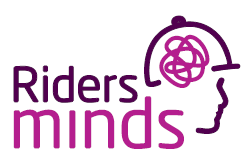
WELCOME TO THE SELF-HELP ZONE
Here you’ll find lots of ideas, tips and techniques to help you look after and take care of your mental health and well-being. Many overlap and can combined for greater effect.
Before you cry, ‘I’m too busy to do anything else!’, this isn’t about doing more or extra things. This is about using what you already have and do, differently, to get more out of them via making simple and subtle changes that could just make that difference between maintaining, or even improving your mental health, and struggling.
As a rider, being with horses already gives you an advantage over many people. Your profession, hobby, pastime involves exercise, fitness, being in the open air, in the countryside, and with magnificent animals – the horse – all things that are proven to maintain and enhance well-being.
However, even in such an environment, life’s ‘ups and downs’ occur which can affect well-being in many ways. What could improve your ability to manage life’s stresses, the unexpected or build resilience.
Read on for some self-help ideas.

Whilst we may think or believe we’re OK, our body often tells us otherwise via a combination of a variety of physical, behavioural, cognitive, emotional change indicators which we may or may not be aware of, or pay attention to. You might just be having ‘one of those days’, although still worth paying attention to, especially if ‘those days’ are ongoing.
As a rider, you have this skill. After all, you get to know your horse’s character, what’s their norm and what’s not, their patterns, triggers for certain behaviours.
So if you are able to recognise their indicators, you can get to know yours so you can recognise your signs and take any appropriate action, sooner rather than later, or not at all.
Can you identify any of yours yet?
What might, or could, your quiet time be?
For example: If you’ve ever enjoyed reading a book indoors on a rainy day, watching your favourite film with friends, a cup of hot chocolate on a cold, miserable day, you’ve probably experienced ‘hygge’.
Here’s 5 suggestions, that can be useful in the non- equestrian working environments too:
-
Bring a mug from home. Have one in the yard tea-room perhaps. Having another in the horsebox for when you’re away overnight(s) can be comforting too. Take time to enjoy ‘tea and talk’ and give your brain a break! Useful in non-equestrian working environments too.
Have a playlist. Music does wonders for the mind. Select your favourites, or meaningful tunes whichever works for you. It’s portable too so will help at home, at the yard, when travelling, at shows etc. or in the office while doing admin or in a non-equestrian working environment. Some yards play music for the horses – it’s good for us too.
Sit and eat your lunch rather than eat ‘on the go’. Have a breather whilst you eat and it’s better for your digestion too! Avoid planning your next task/job while eating and practice not looking at ‘phones or social media. Instead, focus on your food; what you’re eating, drinking, using all your senses to experience it eg. what it looks, smells, tastes, feels like. Focus and be in the moment rather than thinking about what you’re doing next!
Personalise things or places. For example your area of the tack room, your coat/tack hook, grooming bag, or lorry cab, with something meaningful, sentimental from your personal life eg a photo, a key ring. Perhaps use a special pen(s) when updating the yard calendar with events, competitions, vets/farrier visits, etc. Having some sort of personal item that is special/unique for you, can make a difference. Eg stock pin, lapel badge.
Horses and your surroundings. You might often experience ‘hygge’ without realising! Times when you’re ‘lost in the moment’, perhaps quietly waiting with a horse in between classes, the sound of contented munching as you do your night time check, the sun on your back on a lovely summer’s day.
Think about what’s your moment.
- Down-regulates fight/flight and freeze activity stimulated often by stress, stressful situations, by decreasing the release of cortisol, the stress hormone. Lower levels of cortisol are linked with feeling calm, relaxed, content, peaceful yet with a fully focused brain as the decision-making part of the brain, the pre-frontal cortex, is not ‘blocked’ by excessive cortisol.
- Up-regulates intuition, empathy and action. It gets you in touch with yourself, others and the environment, enabling you to respond skilfully and appropriately rather than habitually or your default response.
 Horses by their very nature and being, live in the moment. As prey animals, their survival depends on it. Their primary instinct is awareness, their second is flight. Their brains are wired in such a way that they don’t dwell on the past or worry about the future. They live in the here and now: the present.
Horses by their very nature and being, live in the moment. As prey animals, their survival depends on it. Their primary instinct is awareness, their second is flight. Their brains are wired in such a way that they don’t dwell on the past or worry about the future. They live in the here and now: the present.
By being with horses, equestrians could have power-full and wonder-full opportunities to be ‘mind-full’. Rather than thinking about the next task or other things, focus 100% on the immediate.
For many riders, this mindfulness is the very reason they ride – the escape riding and being with horses brings from home/work/daily life which is ‘parked’ for a while. This applies to competition riders too where sports coaches talk about focusing on the task at hand, not what’s gone before or what could come after.
So, when are your mind-full moments?
Breathing deeply slows down the release of cortisol, the stress hormone, and lowers heart rate as oxygen levels are regularised. That’s why there’s a link between stress and breathing. Stress heightens the symptoms of anxiety and depression, which is why breathing indirectly helps these too. Regularised oxygen levels reduce anxiety and uplift depressive mood.
Try these useful techniques which can be done anytime, anyplace, anywhere. Sitting, standing, riding a horse, preparing for competition, on a train, stuck in traffic. They can double up as mindfulness moments too.
• Let it go! If you find yourself holding your breath, breathe out, long and slow!!
• The slow 7, or whatever count works for you. Take these slow, very deep, soft breaths. Focusing 100% on your breath is cited as a great calming technique for particularly stressful, anxious situations. Do not rush these; allow time to complete the cycles. You can do this to yourself or talk someone else through it.
• 4-4-4 technique. Breathe in, to a slow count of 4, hold for 4, breathe out for 4.
• The paper bag alternative. It’s often said to hold a paper bag over our mouth and nose, if we’re in a state of panic, anxiety, taking very short quick breaths, getting light-headed and dizzy. What happens is the excess oxygen in our body/bloodstream taken in by the quick, sharp, short breaths, gets neutralised by the carbon dioxide temporarily breathed in that builds up in the paper bag. Who carries or has access to paper bags these days!
However, a more practical way is to cup your hands, use a scarf or your sleeve, and place over your nose and mouth. This has the same affect but is easier, more practical and, discreet.
Find out more techniques here: https://www.nhs.uk/conditions/stress-anxiety-depression/ways-relieve-stress/
Try it out – experience the difference a cycle(s) of slow breathing makes.
As an equestrian, you’ll know the impact of body language from working with horses, your own and theirs. How you are around them, your posture, body language, your way of being, whether working from the ground or on board, makes a difference, makes an impact on how they behave, respond etc.
When you’re leading them, do they walk in your space or maintain a polite distance? Do they stay out on the lunge or come in to you, and vice versa? Do they approach you in the field or walk away? Do they politely move round the stable or barge? How do they respond to your riding position and, your change of position? What’s the impact of your seat in a transition, or your posture when jumping?
Your body language via your posture, whether standing or sitting, makes a difference to you, your impact on, and others’ perception of you.
As it does on your horses, it will on the people around you! By simply adjusting or changing your posture, you can change a situation.
Take a look at Amy Cuddy, the international body language expert’s TED talk, including the ‘power pose’ – one of the most popular TED talks of all time.
A quick exercise:
When might this be useful?
How do we regulate, change, alter our mood?
As an equestrian, you recognise horses’ moods…. ‘Oh, Harry’s in a right mood today!’ But what have you based your opinion on?
Transferring that observation skill to yourselves, acknowledging how you are, recognising any changes, thinking how you’d like to be – enables you to do something about it, if that’s what you’d like.
One of the simplest, quickest and easiest techniques is to think or do something that makes you smile.
Your special thing – a memory, a place, inspirational quote, a loved one, song, event, ride that horse that makes you smile. Smiling releases pleasure hormones called endorphins, natural painkillers and antidepressant hormones such as serotonin. Smiling reduces stress and boosts your immune system. Smiling changes our physiology.
Give it a go and experience the difference it makes! Granted, openly smiling in certain situations may be inappropriate, but you can still smile inside – somehow it’s special.
And remember to have fun! It’s easy to forget when work absorbs so much of daily lives. Humour, laughter, smiling is a great stress reliever, and proven good for well-being.
Go on, think of someone, something, some time/event dear to you, to get you smiling inside – how do you feel?
Be aware of ‘Should, ought, must, got to’ language. They have a pressurising and limiting psychological effect. Change to would like, need, want, choose to, better to. These have an effect of putting us back in control, and sense of choice. Watch out for tone of your self-talk too, when it slips from encouraging, gently pushing to harsh, angry, driven.
Change ‘cope’ to ‘manage’. Although the definition of cope is ‘deal effectively with something difficult’ & ‘have the capacity to deal successfully with’, its sound, and physiological impact somehow has a positive/negative vibe. It has connotations with struggling, just about managing. ‘Managing’ has positive/positive affect, somehow sounds more uplifting – puts ourselves (back) in control. Try it! Check out your own reactions to both words.
Remember choice – Often we think we have no choice, but what we’re indirectly focusing on is the consequence of the choice rather than the choice itself. Plus, sometimes things happen we have no control over, but we do have choice how we manage it.
What’s your language indicator?
What are your five a day?


